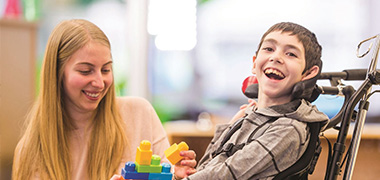
This role has a low level of AI exposure. Core skills such as adaptability, social intelligence, and complex physical tasks remain beyond the capabilities of current AI.
Explore all careersResidential Care Workers support children and adults in various facilities, providing personal services and maintaining close relationships with clients and their families.
Get qualified to work as a Residential Care Worker with a course recognised across Australia. Speak to a training provider to learn more.














In Australia, a full time Residential Care Worker generally earns $1,200 per week ($62,400 annual salary) before tax. This is a median figure for full-time employees and should be considered a guide only. As you gain more experience can you expect a higher salary than people who are new to the industry.
 Courses.com.au Team
Courses.com.au Team
Opportunities for Residential Care Workers in Australia are expected to grow very strongly over the next 5 years as more than 179,000 new jobs open up around the country. Residential Care Workers are employed by adult care centres, nursing homes, aged care facilities, group homes, and rehabilitation units.
Source: Australian Government Labour Market Insights
 Courses.com.au Team
Courses.com.au Team
Get started as a Residential Care Worker with a Certificate III in Individual Support, and if you are working with the elderly or disabled you might also consider additional VET qualifications in those areas — try the Certificate IV in Disability or the Certificate IV in Ageing Support. They take about a year to complete. You will also need a current first aid and CPR certificate, and you might also require an up-to-date influenza vaccination and a police check.
 Courses.com.au Team
Courses.com.au Team
Browse occupations related to Residential Care Worker



If you are aspiring to begin a career in the growing field of community services, consider enrolling in one of the many Residential Care Worker courses in Queensland. These courses, available from several reputable training providers across the region, equip you with the essential skills needed to support individuals in various settings, including aged care and disability support. Notably, popular beginner options include the Certificate III in Individual Support (Disability) and the Certificate III in Individual Support (Ageing), both of which are integral to launching your career.
Students in Queensland can take advantage of the expertise offered by various training providers such as ASH, which delivers the Certificate III in Individual Support (Disability), and CEA, also offering essential training in similar courses. These institutions ensure that all learners receive comprehensive support and up-to-date knowledge critical for working in residential care environments.
For those interested in furthering their qualifications, advanced Residential Care Worker courses in Queensland are available, including the Certificate IV in Disability Support and the Certificate IV in Ageing Support, allowing experienced learners to enhance their skills and career prospects. These programs are designed to develop a more profound understanding of client needs and interventions, preparing graduates for more complex roles within the sector.
Moreover, the significance of these courses extends beyond individual training; they contribute to the larger field of community services, integrating aspects of disability, aged care, and child welfare. The comprehensive education provided by institutions like KIMT and Smart Nation Education prepares students to advocate and support diverse populations effectively, helping to create a difference in their communities.